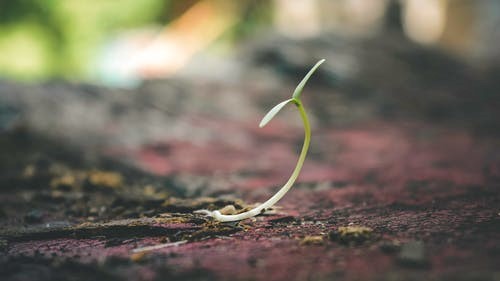Imagine a garden with many sections; some with carrots, lettuce, kales, spinach and onions. Each day the farmer lovingly tends to the garden: watering, removing the weeds and spraying to keep away the insects. As the season gets by, soon the farmer’s efforts are rewarded with a bountiful harvest. The joy the farmer must feel as he relishes the fruit of his labour. Else, imagine a young man sighting a girl he loves. He goes all out to win her heart. He grooms up, buys flowers, even changes the route home just to pass by her home. As the displays of affection get to her heart, she warms up to him and soon tender love and affection blossoms culminating (hopefully) in a happy union. He thereafter lives to enjoy the efforts of his love in the arms of one who truly loves him back.
So the story goes that what we invest in, we grow. If each section in the garden represents an aspect of our lives: physical, emotional, spiritual, social and financial, as we tend and invest our efforts towards nurturing them, with time the fruits of our labor will show. It doesn’t matter whether it is seeds of love or hate, fear or anger, good or bad. The rule applies to all and sundry: what we nurture, what we tend will ultimately grow and bear forth fruit commensurate to the effort we put in. It is also true that we do not nurture what we do not consider important. Want to know what I value? Look at the most developed part of my life. Ideally, we should tend to all the five, though often times we do not.
Tending the garden of our lives enables us live a fulfilling and wholesome life. It causes us to find and live out our life purpose, and to make a difference in the world around us. It causes us have meaningful engagements and our relationships thrive. The process takes time, courage and intention. In the end, we grow and glow.
Define yourself
We cannot have a garden if we do not know where the garden begins and ends. If we planted a garden whose border we are not clear about, and our neighbor in the next garden plants similar crops, it will soon be a source of conflict because it will be unclear whose harvest is more or less. Defining ourselves means we need to first identify who we are. What we define ourselves to be is what we put out there for others to see. I was once asked the question who am I. I defined what I did, what people said or expected but as I spoke I realized I hardly knew who I am. I took time to actually search my heart and determine who I am, what I like, what makes me laugh or cry, what I stand for, what I hold dear. It helped me define my core values. It helped me to define me. A lot of us grow up with an identity crisis, and bring up children with the same problem because they do not know who they are. Not knowing who we are causes us to find identity in things and people and when these are taken away we crumble because they take us with them.
We cannot successfully define ourselves if we do not know our source. I am made in the image and likeness of God. I carry within me the ‘I Am’. I am fearfully and wonderfully made. I am……there begins my definition journey. Identifying my source helps me to define my attributes, those qualities in me that exist because of where I am from. My source is not my parents; neither is it my position, title or career. My source is beyond all that. My source is my creator. He assures me that He made me with a good plan in mind for me.
It is fundamental for one to know that who you are cannot be taken away from you. It is fixed, it is permanent, it is independent of all else. We may forget who we are, and allow ourselves carry on the false titles given to us by life. But deep inside us is the truth of who we are. Once we internalize this, it no longer matters what the world says about us. It ceases to take us down with it. This truth becomes an anchor.
Understand yourself
Once we know who we are, we are ready to take on ourselves and unpackage all the layers that cover us; the results of the moss we gathered as we rolled by in life. We unpack and define what we do, think or say. No judgement, no differentiation between good or bad, just an honest assessment of us. The entire package that is us. This is sometimes a scary exercise because beneath some of those layers are qualities that we are ashamed of others finding out. There may be special traits we have kept hidden and regret for doing so. This is bereft with an intensity of emotions. We will cry and laugh with equal measure as we go through this process but it is important as it makes way for the next stage in finding ourselves. This is a stage where at the end we are laid bare and naked but we ought not be ashamed.
Sorting out
At this point, all is laid bare before us. We now sift through the pieces, carefully examining each and determining why we act the way we do. It is the ‘why’ stage. Like a problem tree in management, we keep asking why until we move from the symptoms to the root problem/cause. Say for example one tends to tell lies; because we grew up telling lies so much it became normal, because as a child our parents kept telling us to lie for them, because they had poor planning and always ended up in debt. Therein lies what we need to redefine: whether lying is a trait we like, and whether lying because our parents did not teach us better is the way we want to live our lives. This process may take us down memory lane, may unearth past ills and hurts we even never thought existed and may be painful. It is important for us to be well anchored in our self-identity otherwise at this stage we will take on our past identities and go back to our old ways, giving up and declaring that is who we are. In this stage, we also take time to define how our attributes affect others around us, and our relationships. What fosters them and what breaks them?
Making a plan
Once we are clear what we do and why, and we have chosen what we want to do moving forward, we then define the ‘how’ to achieve our new self. It is at this point we determine who and for what we wish to forgive and let go. We decide what attributes we intend to grow and exactly how we will work at it. What will we drop off our lives? How will success look like once we are done? What will change? It is the way we talk, is it a weight we wish to achieve? We have to be ‘SMART’ and make very clear and succinct plans. It takes pen and paper and it is hard work. Say for example we have identified that we are poor at communication, and that is it a part of our lives we wish to improve. At this point we research on ways to improve communication. These could be attending trainings, reading books, listening to podcasts, joining support groups etc. For each option, we identify specific solutions eg read a book titled “xxxx” by “xxxxx”. We then determine the period of time over which we wish to work on this attribute. How often will we check in with ourselves to assess progress made? Who else can we enlist to help us be accountable and stay on track? What will our improved communication look like? Maybe it will mean fewer quarrels with our loved ones or those around us. A common mistake at this point is to want to start by correcting all the wrong things we identified in the sorting stage. It takes years to undo the years of damage we have so be kind to yourself and start small. Begin with a few attributes, and progress in them will fire you up to work on other areas. The important thing is to keep going. Journaling the progress made also helps. As we grow and transform, we need to set up boundaries that guide us and protect our identity. We need to be clear about what rests entirely on us and for which nobody else but us can be held responsible. Remember to make a plan for continual growth in each section of the garden.
Growth mindset
One thing for sure about life is that we never stop learning, and when we do, we die. Same case with finding ourselves. It is a journey that lasts our entire lives because even what we have worked on can always be made better. Growth ceases to be a stage and becomes a lifestyle. Being better becomes a way of life and each day we wake up; we seek new areas of our lives to grow in. As we transform, we slowly cause transformation in the world around us. Others too grow from our growth. We purpose to reach out and grow others. This process keeps us focused and in a continual growth phase. Our true measure of growth is not in how much change there is in us, but how much our environment has changed because of us.
It was once wisely said by Bob Proctor that we should ‘Enjoy life, because life is phenomenal! It’s a magnificent trip!’ If we decide which way to go, we determine which destination our life lands at, and we get a chance to make it beautiful. We could also let the winds of life blow us where they will, but we must be willing to accept the destination chosen for us. in it all, may you grow and glow!





Affair 2 article fantastic
Thank you!